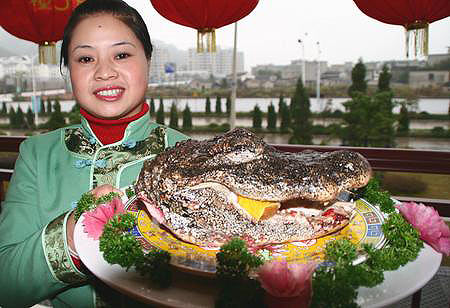Alligator soup raises eyebrows in China
(AP)Updated: 2006-12-02 07:34
SHANGHAI, China - The Huifu Fine-food Restaurant in east China is drawing attention with special menu offerings that include alligator kebabs and soup - complete with the endangered species' head and tail.
"Yes, we do serve alligator here, but the amount is limited every day so you'd better book it at least two or three days ahead," said a staffer at the restaurant, who refused to give his name.
He said the most recommended dishes were alligator steak and soup. "Both of them keep the natural taste of the alligator meat," he said.
The species of alligator served at Huifu - the "alligator sinensis" - is a critically endangered species in its natural habitat, with only about 150 thought to be living in the wild in Anhui and neighboring Jiangxi and Zhejiang provinces along the Yangtze river.
The restaurant obtained a special license from the Forestry Ministry for serving meat from reptiles raised at a breeding center, said a manager at the restaurant, who gave only her surname, Lin. She said four restaurants in Anhui were serving alligator.
Despite the establishment of protection zones and laws against poaching, the population in the wild is falling by 4 percent to 6 percent a year, the official Xinhua News Agency said.
The number of farmed alligators has soared to more than 10,000 because the animals breed prolifically in captivity, unlike another rare Chinese species, the giant panda.
Although breeding centers are struggling to prevent inbreeding among the captive species, the number hatched each year exceeds 1,500.
The Chinese penchant for exotic dishes, mainly in the south, includes all sorts of creatures, including snakes and other reptiles - "anything that flies, walks or swims," according to one traditional saying.
While some reports questioned the wisdom of stimulating demand for an endangered species and potentially encouraging poaching, supporters say sales of alligator meat and skins can help support efforts to save the species.
The alligators slaughtered for food are only those in the third generation of captive breeding - those most likely to be affected by inbreeding, said Wu Xiaobing, an expert on Chinese alligators at the Wuhu-based College of Life Science, Anhui Normal University.
"In my opinion, there's no problem with this," Wu said.
|
||
|
||
|
|

